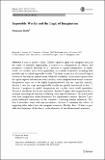Impossible worlds and the logic of imagination
Abstract
I want to model a finite, fallible cognitive agent who imagines that p in the sense of mentally representing a scenario—a configuration of objects and properties—correctly described by p. I propose to capture imagination, so understood, via variably strict world quantifiers, in a modal framework including both possible and so-called impossible worlds. The latter secure lack of classical logical closure for the relevant mental states, while the variability of strictness captures how the agent imports information from actuality in the imagined non-actual scenarios. Imagination turns out to be highly hyperintensional, but not logically anarchic. Section 1 sets the stage and impossible worlds are quickly introduced in Sect. 2. Section 3 proposes to model imagination via variably strict world quantifiers. Section 4 introduces the formal semantics. Section 5 argues that imagination has a minimal mereological structure validating some logical inferences. Section 6 deals with how imagination under-determines the represented contents. Section 7 proposes additional constraints on the semantics, validating further inferences. Section 8 describes some welcome invalidities. Section 9 examines the effects of importing false beliefs into the imagined scenarios. Finally, Sect. 10 hints at possible developments of the theory in the direction of two-dimensional semantics.
Citation
Berto , F 2017 , ' Impossible worlds and the logic of imagination ' , Erkenntnis , vol. 82 , no. 6 , pp. 1277-1297 . https://doi.org/10.1007/s10670-017-9875-5
Publication
Erkenntnis
Status
Peer reviewed
ISSN
0165-0106Type
Journal article
Description
This paper is published within the project “The Logic of Conceivability”, funded by the European Research Council (ERC CoG), grant number 681404.Collections
Items in the St Andrews Research Repository are protected by copyright, with all rights reserved, unless otherwise indicated.

